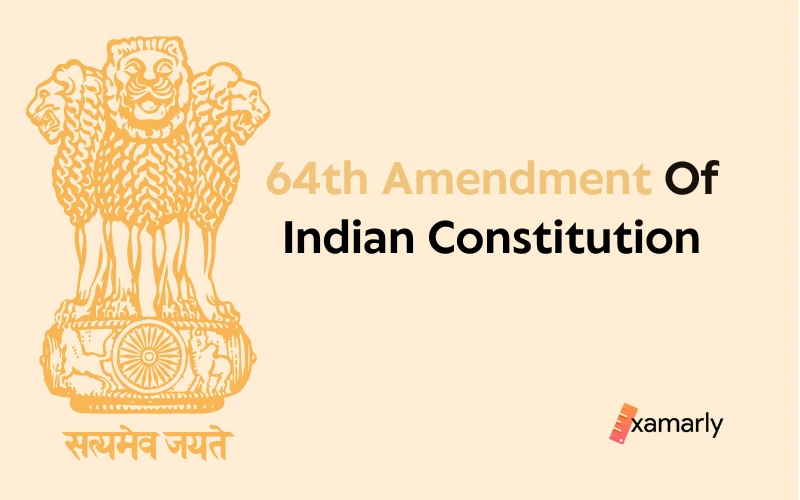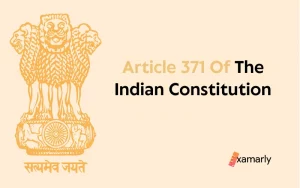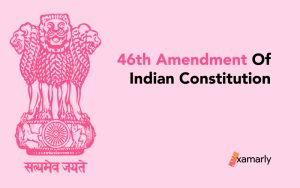The 64th Amendment of the Indian Constitution passed on April 16, 1990, holds great significance in the country’s constitutional history. The Amendment aimed to address the pressing issues in the State of Punjab and proposed to amend Article 356 to facilitate the extension of Proclamations related to the region.
This piece of writing provides you a piece of valuable information regarding the 64th amendment of the Indian Constitution.
Background
On 11 May 1984, a proclamation of three years was issued in the state of Punjab which would be ended on 10 May 1990, but the prevailing situation was not fulfilled for holding good and peaceful elections to the state legislative assembly in the state.
In the All-Party Meeting assembled by the Governor of Punjab at Chandigarh, representatives of both parties proposed to extend the proclamation period to a total of three years and six months.
Salient Features and Facts
Article 356 was amended as part of the 64th amendment which deals with the president’s rule and was taken place on April 16, 1990. In the state of Punjab, the change primarily allows the president to govern for up to three years and six months.
Date Enacted
In the Forty-First Year of the Republic of India, on 16 April 1990, Sixty-Fourth Amendment came into existence.
Statement of Objects and Reasons
The Statement of Objects and Reasons that was added to the Constitution (Sixty-fifth Amendment) Bill, 1990, which later became The Constitution (Sixty-fourth Amendment) Act, 1990, served as an explanation for the proposed changes to the Indian Constitution.
Any proclamation made under the Article 356 that is approved by both the Lower and Upper Houses of Parliament may not be in effect for longer than three years. This is in line with the provisions of clause 4 of the said Article of the Indian Constitution.
However, according to clause (5) of the mentioned article, neither House of Parliament can pass a resolution to extend the validity of a Proclamation issued under clause (1) of that article for more than one year, unless two conditions are fulfilled.
Firstly, there should be an ongoing Proclamation of Emergency in the entire state or a part of it, and secondly, the Election Commission must certify that the continuation of the Proclamation under clause (1) is necessary due to challenges in conducting general elections for the State Legislative Assembly, as mentioned in that clause.
In the case of the Proclamation issued on May 11, 1987, about the State of Punjab, the three-year timeframe would expire on May 10, 1990, and the aforementioned two conditions would likewise still not be met by that date.
The existing conditions in the State at that time are not conducive to conducting fair and peaceful elections for the State Legislative Assembly.
During the All-Party Meeting called by the Governor of Punjab in Chandigarh, the representatives from different political parties agreed that it was essential to establish a conducive environment before conducting elections for the State Legislative Assembly.
The aforementioned Proclamation about the State of Punjab has been proposed to be prolonged for a time span of three years and six months, which would necessitate an amendment to clauses (4) and (5) of Article 356 of the Indian Constitution.
The bill aims to accomplish the aforementioned goals.
Prominent People Involved
The government of Rajiv Gandhi represented the bill in Lok Sabha.
Mufti Mohammed Sayeed introduced the statement of objects and reasons on 02, April 1990.
Important Provisions of the 64th Amendment of the Indian Constitution
Amendment of Article 356.-In Article 356 of the Constitution states that:
(a) The second proviso in subsection (4) shall be followed by the proviso that reads as follows:
It is further specified that for the Proclamation that was issued under clause (1) on May 11th, 1987, pertaining to the State of Punjab, the mention of “three years” in the first provision of this clause should be interpreted as “three years and six months.”
(b) At the end of clause (5), the following proviso shall be added:
This clause does not pertain to the Proclamation that was issued under clause (1) on May 11th, 1987, regarding the State of Punjab.
Related – 67th Amendment of the Indian Constitution
Summing Up
Article 356 of the Indian Constitution was updated as part of the 64th Amendment on April 16, 1990. This article addresses the imposition of the President’s Rule. Essentially, the amendment extends the president’s control in Punjab for a maximum of three years and six months.
In the interest of further readings:
| Important Amendments of the Indian Constitution | Tricks To Remember Amendments of the Indian Constitution |
| 68th Amendment of the Indian Constitution | Article 365 of Indian Constitution [President’s Rule] |
FAQs on the 64th Amendment of the Indian Constitution
What purpose did the 64th Amendment of the Indian Constitution serve?
In the state of Punjab, the president may reign for up to three years and six months per the 64th amendment to the constitution.
When was the 64th constitutional amendment held?
On April 16, 1990, the 64th amendment of the Indian Constitution came into force.
What is the Article 356 of the Indian Constitution?
In the event that the constitutional machinery of a specific state is unable to function properly, Article 356 of the Indian Constitution grants the President of India the authority to impose “presidential rule” on that state.
What changes were made to Article 356 by the 64th amendment?
The 64th amendment of the Indian Constitution added a proviso to Article 356(4) to allow for the extension of the President’s Rule for a total period of three years and six months in the state of Punjab.






